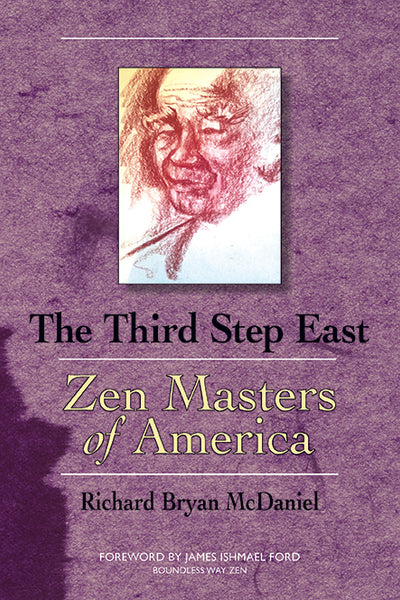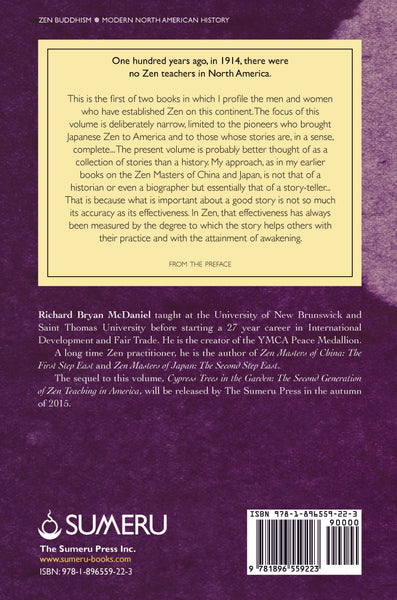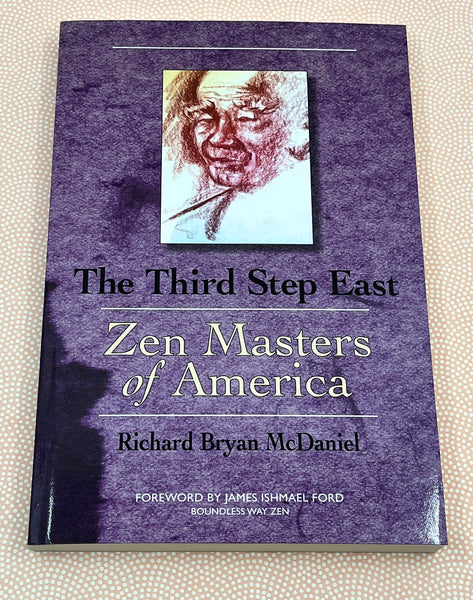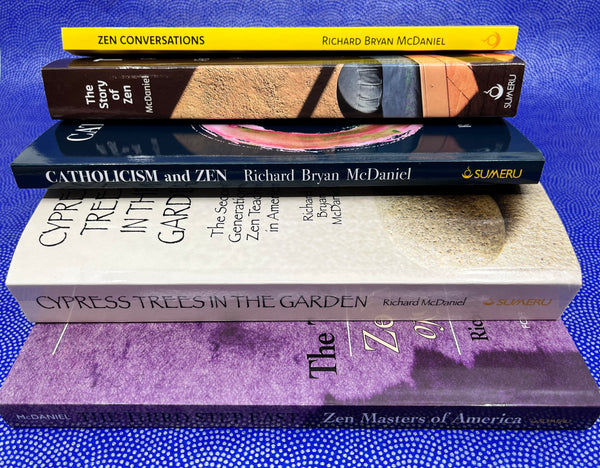The Third Step East: Zen Masters of America
266 pages, paperback, 6.14 x 9.21 inches (royal octavo)
12 Illustrations, Bibliography, Index of names
Zen, American Buddhism, History, Biography
THE THIRD STEP EAST: Zen Masters of America
By Richard Bryan McDanielForeword by James Myoun Ford
In The Third Step East: Zen Masters of America, Richard Bryan McDaniel continues the story, begun in his earlier work, of the spread of Zen from India to China (Zen Masters of China: The First Step East), thence to Japan (Zen Masters of Japan: The Second Step East), and then to North America and Europe.
As McDaniel points out in the prologue to this book, the history of Zen practice in United States is less than a hundred years old. The first Zen priests sent to America from Japan were assigned to temples which served the immigrant population on the west coast. The temples functioned as community centers where traditional values were retained and respected. The priests’ responsibilities were similar to those of their Christian counterparts, to perform wedding and funeral services, to conduct memorial services, and to carry ritual ceremonies for the benefit of their congregations. Although Zen was understood to be the meditation school of Buddhism, meditation was viewed as an activity for monastics and clergy, not for lay people.
McDaniel’s book demonstrates how this tradition was transformed into a lay practice in the west. He begins by examining the social and cultural factors in America which led to an initial theoretical interest in Zen during the 1940s and ’50s, after which he profiles the individuals who fostered that interest, including D. T. Suzuki, Alan Watts, and the Beat Generation of writers. Ironically, during the 1960s, when Zen was on the decline in Japan-because the youth of that country viewed it as a remnant of the old feudal and the militaristic structures responsible for a the war that had ended so disastrously for the country-youth culture in America came to look upon Zen as a way of escaping from the intellectual and social constraints of their culture.
Chapters are dedicated to the lives and work of the early teachers who established Zen practice in the West: Robert Aitken, Shunryu Suzuki, Eido Shimano, Taizan Maezumi, Philip Kapleau, Dainin Katagiri, and others. A summary of the main elements of the teaching styles of each of these is provided, giving readers an overview of the different training methods used by these pioneers and the ways in which they adapted an ancient Asian tradition to a new environment. The book also collects and retells some of the stories associated with these teachers which have begun to circulate within Zen circles, much as earlier tales of their Asian predecessors have done. The story of American Zen is continued in a sequel to this work, entitled Cypress Trees in the Garden: The Second Generation of Zen Teaching in America, (Sumeru, 2015). It describes the heirs and legacies of the Zen Masters and teachers profiled in The Third Step East.
REVIEWS
The best book yet on the transmission of Zen to the West.
—Genjo Marinello, Abbot, Chobo-Ji
…honest and vivid…essential reading to anyone interested in the history of Zen and Buddhism in America.
—Justin Whitaker, American Buddhist Perspective blog
I find my heart beating faster as I read these stories, brought together with attention and care. This book sings to us of something coming to form, a
living and dynamic spiritual tradition taking shape today, sinking roots into new soil. I hope as you read this volume, you will be entertained, and informed. But, most of all, I hope you, too, feel invited into this continuing, rich, story. It is something important.
—James Myoun Ford [from the book’s foreword]
ABOUT THE AUTHOR
 Rick McDaniel taught at the University of New Brunswick and Saint Thomas University before working in International Development and Fair Trade with the YMCA. He is the creator of the YMCA Peace Medallion. Dr. McDaniel has described himself as a Roman Catholic by birth and heritage and a Zen practitioner by nature and temperament.
Rick McDaniel taught at the University of New Brunswick and Saint Thomas University before working in International Development and Fair Trade with the YMCA. He is the creator of the YMCA Peace Medallion. Dr. McDaniel has described himself as a Roman Catholic by birth and heritage and a Zen practitioner by nature and temperament.












